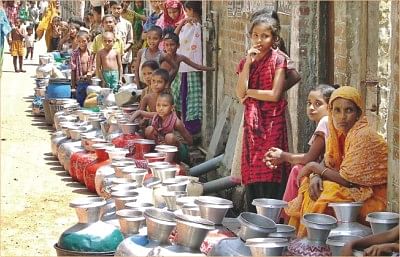Cwasa totters with acute water crisis

City dwellers wait for Wasa water keeping their containers in a long queue. The photo was taken from Enayet Bazar Railway Colony in the port city recently. Photo: Anurup Kanti Das
The residents in the port city are facing acute water crisis as the Cwasa is able to supply only 42 percent of the total demand daily.
They said they get Wasa supplied water for two to three days a week for two hours only leaving them to depend on private deep tube wells for water to continue their daily work for rest of the days.
Chittagong Water Supply and Sewerage Authority (Cwasa) even can not maintain the water supply in its network regularly, the city dwellers said, adding that it, sometimes, supplies water for one time in two days.
Sabiha Akter, a resident of west Madarbari, said Cwasa supplies water for two to three days for two hours a week which is quite insufficient for daily use. During the dry season, it becomes worse as sometimes they do not get Wasa-supplied water for two to three weeks, she added.
Faridul Alam of Halishahar area said like other parts of the city they are also facing the water crisis as they have water supply for two days a week due to technical problem of the deep tube wells.
“The economically solvent people have set up their personal deep tube wells which is not possible for every one. Wasa should establish more tube wells or create alternative arrangement for water”, Faridul added.
Chwakbazar,Dewanhat, Bakulia, Bohadderhat, Nasirabad and GEC area in the port city are facing the same problem of water, said the local people.
When asked about the poor condition of water supply in the port city, Cwasa Managing Director Engr AKM Fazlullah said Cwasa could not do any remarkable job in water production or supply in the port city due to negligence to Cwasa by the successive governments for long. He said Cwasa is now very sincere to solve the water crisis.
Cwasa sources said Wasa has not only the problem of production or supply but also has the problem in pipe lines. The official said there is a 615-kilometer pipe line in the city with very poor networking for water supply.
Cwasa officials said under the Emergency Water Supply Project Wasa is installing a 20km pipe line to be completed within 2011 admitting that it would not cover the city.
Cwasa Chief Engineer MD Safiullah said they have no plan to expand pipe line network in recent future.
Fazlullah, however, hoped to bring a radical change in water supply within 2015 when the on-going projects like Karnaphuli Water Supply project, Mohora Extension Project, Mohora-Kalurghat Water Treatment Plant Rehabilitation Project and some other small projects will be completed. He said they will be able to meet 98 percent of total demand after completion of the projects.
Cwasa was established in 1963 to serve the city dwellers with pure drinking water and ensure the sewerage system here. But the 47-year-old Cwasa could not establish the sewerage system till now, failing to fulfill even 50 percent of total demand for water in the port city.
Cwasa fulfilled 70 percent of demand for a very brief period in 1980 producing 30 million liter of water per day. With the population increasing, production and supply of water could not enhanced. Establishing the Mohora plant to purifying the surface water from Halda River in 1988, Wasa brought a little change in production. In early 90s, the supply of water reached 54 percent which was reduced to 41 percent in 2000.
According to Cwasa, demand for water in the city is 500 million liter per day with capacity of providing 210 million liter. This is 42 percent of total requirement. Of 210 million liter, 120 million comes from deep tube wells and 90 million from Mohora plant. Due to shortage of supply of water, urban life in the port city has become miserable.

 For all latest news, follow The Daily Star's Google News channel.
For all latest news, follow The Daily Star's Google News channel. 



Comments